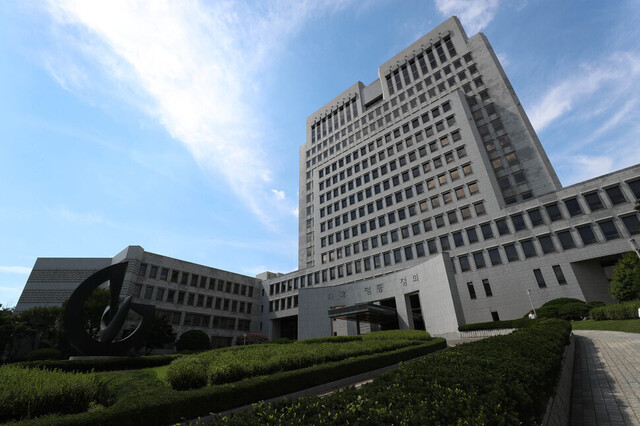 material photo.” alt=”A view of the Supreme Court.
material photo.” alt=”A view of the Supreme Court. A view of the Supreme Court. <한겨레> Material photo.

Choi Hansoo l Professor of Economics and Trade, Kyungpook National University
How do judges make decisions? According to legal realism, judges, like any other person, make judgments for specific purposes. So what is the purpose? In an analysis of the Japanese judiciary, Harvard University professor Mark Ramsayer argues that it is a desire for the promotion of judges. He saw that the promotion system based on seniorityism in the Japanese judiciary was a channel through which judges could use this aspiration to make political decisions. In fact, Professor Ramseyre found that judges who made favorable decisions to the LDP were later promoted to high-ranking judges more quickly after receiving good positions. These insights also apply to the Korean judiciary, as seen in Judicial Nongdan during the days of the Supreme Court of Yang Seung-tae. This case was a collaboration between the Chief Justice of the Supreme Court, who sought to concentrate power using personnel rights, and unethical judges from several administrative offices in the elite course. However, what is more regrettable than the trial Nongdan is that the Supreme Court Chief Kim Myung-soo did not proceed with proper disciplinary action or meaningful system improvement. This confirmed that the court was not an organization capable of self-cleaning. And they also learned that the sovereign had no means to hold them accountable unless the National Assembly impeached the judge. As a result, the people’s distrust in the courts grew. Autonomy has increased, because accountability is extremely lacking. From the perspective of the public, judges are’legal aristocrats’ who enjoy only authority but are not responsible. Some may say that autonomy is based on the democratic legitimacy of the judiciary, but I disagree. It is self-evident that judges appointed through the bar exam or bar exam are not given the presidential level of legitimacy elected by direct public vote. In these circumstances, the minimum expectation that sovereigns place in the courts is judicial restraint. The autonomy of the court can also be recognized when there is a mode of moderation that respects the legitimacy of matters recognized by the executive’s discretion. However, the appearance of the courts in recent years is far from this. The court cited the suspension of execution for the two-month suspension of the prosecutor general on the grounds that there were irreparable damages without sufficient grounds. As a result, the President’s disciplinary power, which is a means of controlling the prosecutor-general, who abuses his authority, has been private. According to the court’s logic, the control of personnel rights by the president over the prosecutor general can only be reduced and reprimanded. This is because all personnel control over that is now irreparable. Is the political independence of the prosecutor general a constitutional value that is important enough to indemnify the abuse of individual authority, and is the position also an institution with democratic legitimacy comparable to that of the president? And was it right to make this judgment in the decision to suspend execution rather than in the main case? It’s not just this. Samsung Electronics Vice Chairman Lee Jae-yong’s decision to farewell to the destruction is a probation and is running. At the beginning of the trial, he interpreted the US regulations arbitrarily and recommended the establishment of the Compliance Committee, but now adopted the report of a professional judge in the form of a watermelon smudge. Several legal experts predict that the presiding judge will be sentenced to probation based on the sentence in February next year. Therapeutic judicial according to the judge’s opinion? This is just the primary color’genetic innocence’. In this way, when the court tries to justify the power elite’s position in the name of autonomy, distrust inevitably grows. Two Nobel laureates in economics, Jean Tyrol and Eric Maskin, asked in 2004, “When and when should a judge be elected?” They believe that the judge election system is not always desirable socially. This is because there is a risk that a judge will make a wrong decision that suits the taste of the voters for the election. At the same time, however, they see the electoral system as desirable as judges represent the interests of a particular class. This is because the people are given the opportunity to punish judges who have given up on being the guardians of the public interest. The court ruling is so important. This is why the judgment cannot be left only in the hands of 3,200 judges. The people have the right to criticize the wrong decision. Also, if the erroneous ruling is due to a structural problem of the court, whether it is an election or whatever, the sovereign should be given the power to correct the matter. This is the responsibility and the responsibility of the National Assembly. Even before that, the court should also listen to these voices of distrust and concern and show moderation.
